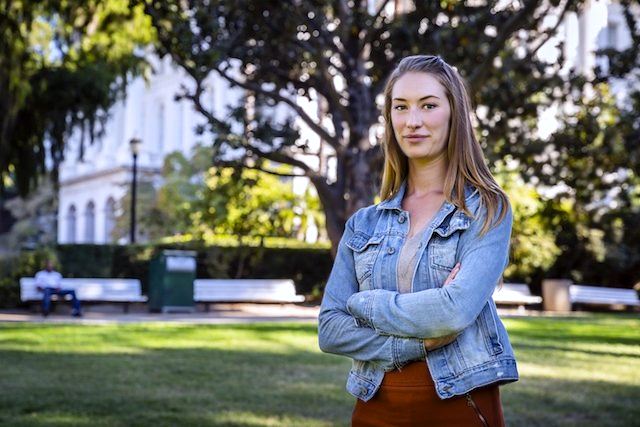When Global Climate Issues Go Local

Perhaps the greatest life lesson recent graduate Elea Becker Lowe MAIEP ’18 can share is one she herself has heeded: when presented with an opportunity, go for it.
She came to the Institute in 2016 to pursue a degree in international environmental policy with the intention of working on conservation efforts in South America. “However, the presidential elections had a huge impact on my plans, as they did for many other students. California quickly became a global leader on climate change in the midst of major political shifts.” She secured a position with the California Natural Resources Agency, where she writes policy and manages collaborative efforts to help the state adapt to current and future climate change events. This summer she worked on California’s ambitious response to the federal government’s lack of commitment to global environmental leadership—the Global Climate Action Summit held in September.
It takes incredible vision to put something like this on. The Global Climate Action Summit included multiple events all over California. When the planning first started, it was hard to see how an event of this magnitude could be pulled off, but with a huge collaborative effort it all came together.
Protesters outside the venues were at least as important to the cause as the official events that week. Part of the rationale behind the summit was to maintain the commitments of the Paris Agreement, celebrate the achievements of change.makers all over the world, and let people know that there is still a lot of work to do to reach the ambitious goals that states like California have committed to. The protesters highlighted just how difficult it is to meet these goals. Many were showing up to say we were not doing enough. The whole point was to motivate people, to learn from one another, and to move forward on climate change action. The fact that so many diverse and opinionated groups came out to one place to take a stand was a sign of success and a beacon of hope against a much larger challenge.
It is really exciting to see how much is actually being done to combat climate change around the world today. I was very lucky to have a small part with the planning team. The amount of people actually working on innovative initiatives to combat climate change impacts, safeguard against adverse events, and develop technology to remove and sequester carbon from the atmosphere is beyond inspiring. If we continue to share our best practices, challenges, needs, and resources at a global scale, I believe that we have a real chance to affect climate change.
We can’t look to the past to create our policies on climate change because we cannot be certain exactly how and when climate change events will manifest. Instead, social and environmental policy must look to projections of future scenarios to determine the way forward. Infrastructure plans now have to take into account unprecedented scenarios for drought, forest fires, and other events, and the same applies to other policies.
If we continue to share our best practices, challenges, needs, and resources at a global scale, I believe that we have a real chance to affect climate change.
Growing up in the woods of Vermont, I was always interested in environmentalism, but as I pursued my degree in environmental engineering, I realized I wanted a career more focused on the social experience. I turned my engineering degree into a math major and added minors in economy and philosophy. Vermont is a beautiful and amazing place to call home. While I grew up in a very open-minded family, it wasn’t until I started traveling that I realized I’d been living a sheltered life. After college I started traveling in Central and South America, then spent almost two years living and working abroad in New Zealand and Australia.
Wake-up calls are often unexpected. Whereas during the week, I spent my time working in finance for a large telecommunications company in New Zealand, on the weekends I found myself planting trees, restoring native habitat, and doing other conservational tasks. My boss was an amazingly strong, action-oriented lady who almost immediately became my most inspiring career role model. When she suddenly quit her job, I was crushed and confused. But before she left she told me that if I had any motivation to pursue something else, something that really fed my soul, I should go after that instead, and soon. Shortly after, I too quit my job, began traveling once again, and started researching graduate schools.
You have to believe hard work pays off. I am a big believer in making the most of every opportunity, and most of the time that means working hard even when it is difficult to see where your efforts will lead.
Groundwork for real change happens on the lower levels. As we learn in many classes at the Institute, no lasting change happens without the participation of the people. The Trump administration’s opposition to environmental policy and regulations has motivated many stakeholders to take matters into their own hands. Local governments, private businesses, and individuals are stepping up; that is where the change will happen.
For More Information
Jason Warburg
jwarburg@middlebury.edu
831-647-3516
Eva Gudbergsdottir
evag@middlebury.edu
831-647-6606
